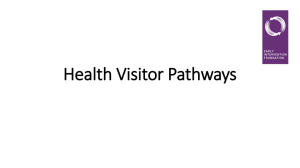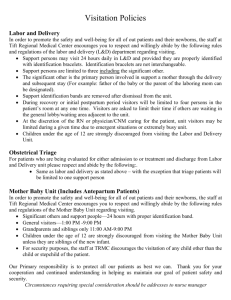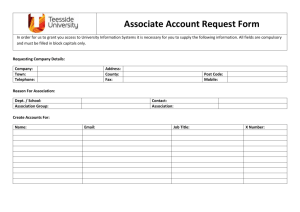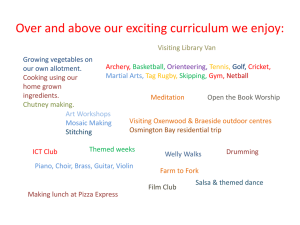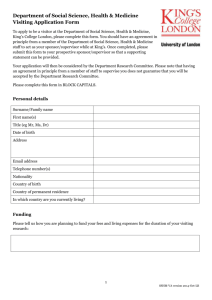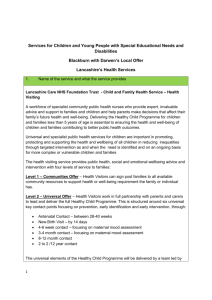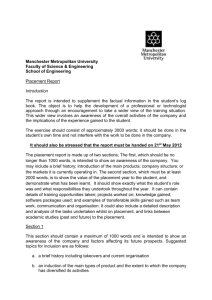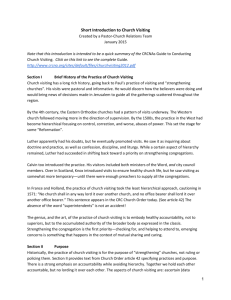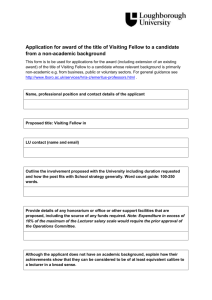Health Visiting - Isle of Wight NHS Primary Care Trust
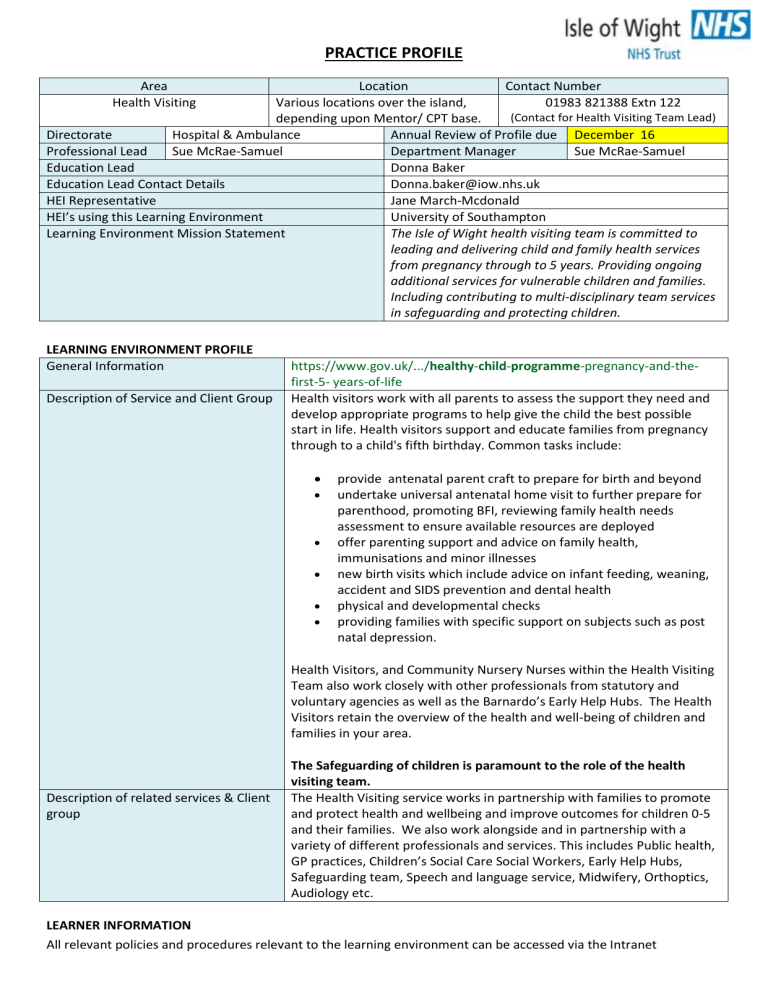
PRACTICE PROFILE
Area
Health Visiting
Location
Various locations over the island, depending upon Mentor/ CPT base.
Directorate Hospital & Ambulance
Professional Lead Sue McRae-Samuel
Education Lead
Education Lead Contact Details
Contact Number
01983 821388 Extn 122
(Contact for Health Visiting Team Lead)
Annual Review of Profile due December 16
Department Manager
Donna Baker
Donna.baker@iow.nhs.uk
Sue McRae-Samuel
HEI Representative
HEI’s using this Learning Environment
Learning Environment Mission Statement
Jane March-Mcdonald
University of Southampton
The Isle of Wight health visiting team is committed to leading and delivering child and family health services from pregnancy through to 5 years. Providing ongoing additional services for vulnerable children and families.
Including contributing to multi-disciplinary team services in safeguarding and protecting children.
LEARNING ENVIRONMENT PROFILE
General Information https://www.gov.uk/.../healthy-child-programme-pregnancy-and-thefirst-5- years-of-life
Description of Service and Client Group Health visitors work with all parents to assess the support they need and develop appropriate programs to help give the child the best possible start in life. Health visitors support and educate families from pregnancy through to a child's fifth birthday. Common tasks include:
provide antenatal parent craft to prepare for birth and beyond
undertake universal antenatal home visit to further prepare for
parenthood, promoting BFI, reviewing family health needs assessment to ensure available resources are deployed
offer parenting support and advice on family health, immunisations and minor illnesses
new birth visits which include advice on infant feeding, weaning, accident and SIDS prevention and dental health physical and developmental checks providing families with specific support on subjects such as post natal depression.
Health Visitors, and Community Nursery Nurses within the Health Visiting
Team also work closely with other professionals from statutory and voluntary agencies as well as the Barnardo’s Early Help Hubs. The Health
Visitors retain the overview of the health and well-being of children and families in your area.
Description of related services & Client group
The Safeguarding of children is paramount to the role of the health visiting team.
The Health Visiting service works in partnership with families to promote and protect health and wellbeing and improve outcomes for children 0-5 and their families. We also work alongside and in partnership with a variety of different professionals and services. This includes Public health,
GP practices, Children’s Social Care Social Workers, Early Help Hubs,
Safeguarding team, Speech and language service, Midwifery, Orthoptics,
Audiology etc.
LEARNER INFORMATION
All relevant policies and procedures relevant to the learning environment can be accessed via the Intranet
Work Pattern (Start, finish times)
Dress Code
Induction/Orientation programme
Staff / rest room facilities
Expectations during placement
This can be flexible to the service requirements; however usual working hours are between 9am -5pm Monday – Friday.
IOW NHS Trust dress code policy (see Trust intranet)
Organisational induction by CET followed by local induction within clinical area
Depending on student’s base there may be a rest room available.
There is the expectation that the student will contact the team lead – Sue
McRae-Samuel ( Susan.McRae-Samuel@iow.nhs.uk
) 01983 821388 Extn
122 to identify allocated base and mentor/ CPT. The student must then contact the allocated mentor to make arrangements for the commencement of practice.
There is the expectation that the student will prepare for this placement by identifying to their mentor their desired learning outcomes. Reading the Healthy child Programme will further prepare you for this practice based experience as will being familiar with Childhood Immunisation schedule.
Students must at all times behave in a professional manner, ensuring acceptable personal values and attitudes throughout practice. The student must adhere to the NMC code of conduct, promote confidentiality, safe practice and ensure all children and families are treated with respect and dignity.
The student will be working with families and the wider multi-agency team to protect and promote their health and wellbeing, therefore the student should use this opportunity to reflect on experiences in practice to help guide the student in linking theory and practice. This will also help to identify gaps in knowledge and areas which require further research.
During the placement the student will also be given the opportunity to attend a number of public health visits with other members of the multiagency team to enhance their learning experience.
LEARNING OPPORTUNITIES & RESOURCES
Recommended reading/Websites https://www.gov.uk/.../healthy-child-programme-pregnancy-and-the-first-5- years-of-life www.ihv.org.uk
Common Abbreviations
Specific learning opportunities
Specific areas of expertise/clinical skills
CPT – community practice teacher. Other’s will be discussed during the practice placement.
This will be discussed with your Mentor/ CPT at your initial interview when looking at the students learning needs, alongside the practice induction.
Being skilled at identifying vulnerable families means health visitors can enable parents to express their needs through a family health needs assessment and decide on the support they receive. The type of support can include:
referring families to specialists e.g. speech and language, audiology, orthoptist
arranging access to support groups, such as those provided by Early
Help hubs e.g. breastfeeding support group, baby massage, stay & play, counselling
All relevant policies and procedures relevant to the learning environment can be accessed via the Intranet
organising practical support - for example working with a nursery nurse on the importance of play or providing baby massage to enhance bonding and attachment where there may be concerns regarding maternal mental wellbeing and postnatal depression
Common Assessments /
Interventions/Care pathways
Please see the Healthy Child programme for outline of Universal, Universal plus and Partnership plus assessments and interventions. https://www.gov.uk/.../healthy-child-programme-pregnancy-and-the-first-5- years-of-life
The Health Visiting service have rewritten an antenatal and postnatal health needs assessment which is embedded in practice together with a full suite of pathways in relation to a variety of areas linked to Health visitors role which are available on the ‘K’ Drive on the Trust intranet, and will be available in hard copy within a folder - see individual bases for copies of the completed pathways.
Care pathways, patient feedback via Friends & Family test. Models of practice experience e.g.
Hub and Spoke, Care pathways,
Patient Journeys
MULTIAGENCY LEARNING OPPERTUNITIES / RESOURCES
Multiprofessional learners accessing the environment
We have a variety of professional s in training who either spend their whole practice placement with the team or those that shadow the health visiting team for public health activities, this includes trainee GP, SCPHN students, midwifery and paediatric nursing students.
Professionals working in the environment
Adult, Mental health, Midwifery and Paediatric trained nurses who have completed the Specialist Community Public Health training to become Health
Visitors. There are also two community nursery nurses within the team, as well as administrative support workers.
Opportunities to meet EU directives
(Nursing)
Child Health, Public Health
Opportunities for insight to EU Directives linked to mental health.
Updated 18 th September 2015/SM-S Team Lead Health Visiting
All relevant policies and procedures relevant to the learning environment can be accessed via the Intranet
